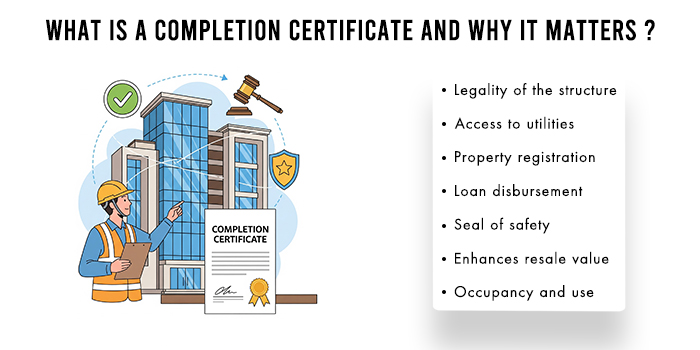A completion certificate or CC is an official document issued by the local development authority or civic body once construction of the project is completed. The document is evidence that the building has been developed in compliance with the approved building plan, certified layout and all applicable structural and safety norms. The main purpose of this certificate is to corroborate the lawful execution of the construction project.
In real estate parlance, a CC denotes the official closure of the construction phase. It ratifies that the building is fit for occupancy and that it satisfies the legal requirements for construction. Without a CC, the project will be deemed legally incomplete, notwithstanding its physical appearance.
Why is completion certificate important?
A CC is a compulsory requirement under municipal law and has several key implications:
- Legality of the structure: Without a valid certificate of completion, the building might be deemed illegal, which could result in penalties or even demolition.
- Access to utilities: The CC is essential to procure connections for utilities like water, power and sewage.
- Registration: In most cases, an apartment/house can’t be registered in the buyer’s name without a completion certificate. This could be a major hindrance to a resale or transfer in future.
- Loan disbursement: Banks and financial institutions need a CC before disbursement of the final instalment of a home loan. Without a CC, processing of a loan could be delayed or even denied.
- Seal of safety: A completion certificate is confirmation of the construction adhering to safety standards and building codes.
- Enhances resale value: A valid CC raises a property’s marketability and resale value, since buyers feel reassured of its legal and safety status.
- Occupancy and use: The completion certificate is mandatory for legal occupancy and use of the building. It ensures that the property is legally sound, safe and fit for occupancy.
When is a completion certificate granted?
A CC is issued only after the municipal body/town planning department/local development authority carries out a thorough inspection. The checks are for:
- Compliance with sanctioned blueprint.
- Adherence to safety and environmental norms.
- Proper usage of floor area ratio (FAR).
- Ensuring construction of common areas like staircases, fire exits and parking lots.
How does one verify a completion certificate?
- Seek a copy of the CC from the developer.
- Verify with the municipal body or local development authority website.
- Consultant a real estate consultant or lawyer to validate the document.
For under-construction properties, you can refer to the RERA website to track the project’s compliance status.
If the builder fails to provide a CC:
- The occupancy certificate for the project may not be granted.
- Banks may withhold loan disbursement.
- Your property may be deemed illegally constructed.
- Registration or resale will be tricky.
To sum up For every homebuyer, it’s extremely critical to understand the significance of a completion certificate. A CC is not just another technical document. It’s legal guarantee that the property is built safely, lawfully and as promised, so that you are protected against future complications.





